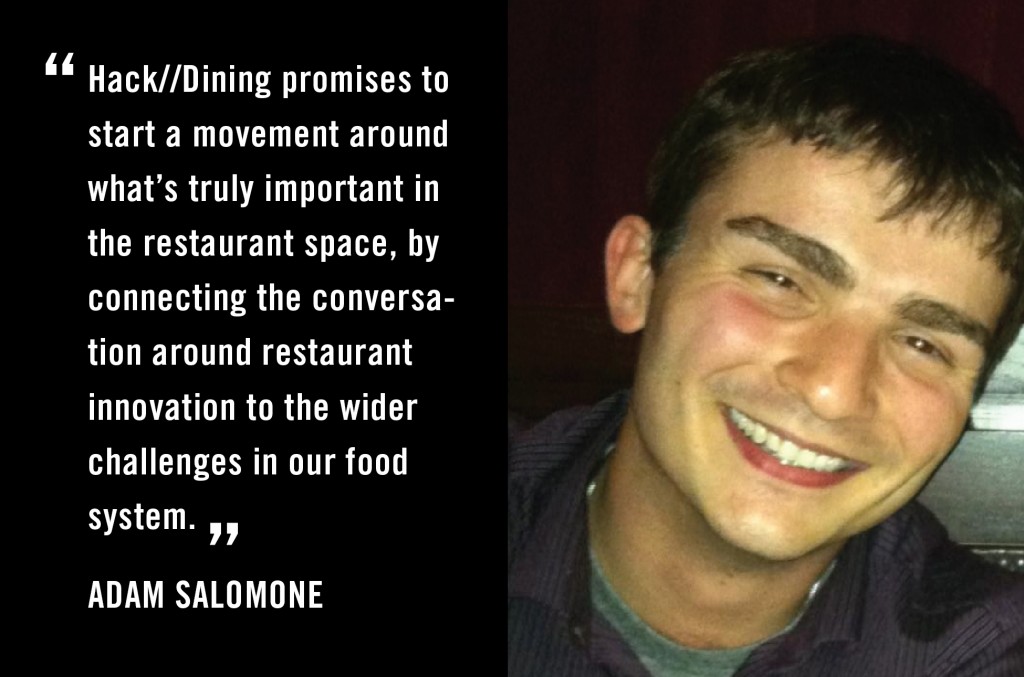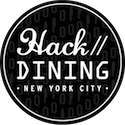Guest post by Adam Salomone, Associate Publisher, The Harvard Common Press. The views expressed here are solely those of the author and do not reflect the views of Food+Tech Connect.
I love dining out, taking a romantic view of the culinary possibilities available in a restaurant when I can order just about anything I want. Dining out is an experience, it’s an opportunity to try new foods, to experiment, to be a culinary visitor in someone else’s kitchen. But, for many of us, restaurants seem to be somewhat disconnected from the overall conversation about the challenges facing our food system. From food access and scarcity, to waste and water stewardship, the tremendous pressures that we have to feed a growing population are both reflected, and often overlooked, in the restaurant setting. As an example, it’s well-documented that roughly half the food grown and put into the food system is lost to food waste. 15% of that wastage is found in the restaurant setting.
In short, the restaurant ecosystem is broken. Or at least, very inefficient.
And while we’ve all seen plenty of new restaurant-tech innovations that are meant to make restaurants operate more efficiently, many of these are “me too” mobile payment apps and tablet ordering programs that represent only a small part of the puzzle. Why am I excited about Hack // Dining? Because it promises to start a movement around what’s truly important in the restaurant space, by connecting the conversation around restaurant innovation to the wider challenges in our food system.
The innovations that will begin to tackle some of these challenges represent a combination of technology solutions tailored to restaurant operations and management. And, taken together, they also provide a 360-degree approach to the problems facing restaurants, dealing with both front-of-house and back-of-house management issues. Some of these include:
- Inventory management – While it seems obvious, one of the main areas where restaurants can build greater efficiency into their systems is in inventory management. While there are a number of startups working to innovate digital platforms for food buying, these haven’t yet touched on the opportunity in the restaurant space. Such a platform for online sourcing and buying of food inventory would allow restaurants to more easily track data around their food, including relevant pricing, consumer demand, and potential expiry dates.
- Data tracking and personalization – Customer retention and loyalty is a major area of investment for restaurants, and there is plenty of opportunity for technology to power more robust consumer data tracking systems. While much of this innovation could and would center around consumer order preference to offer better service on a recurring basis, it could also be used to track demand for specific menu items and better understand repeat customer engagement metrics. Such data could be very powerful in helping restaurants operate at a greater margin, and also better understand their most valuable customers in the process.
- Back-of-house operations – This represents a very broad range of platforms and services, but I see the most potential for staff management and retention. Especially when so much attention is being paid to staff wages (or lack there of) in the restaurant setting, new platforms could allow restaurants to more efficiently manage their staff time, build-in rewards and incentives for top-performers, and track customer reviews of specific servers, among other things. All of these solutions could positively affect a restaurant’s ability to retain their best employees, reduce staff churn rates, and create more robust wage-earning opportunities.
All told, the above is just a small subset of the possibilities available in the dining space. It is an area of food innovation that is still in the early stages, and represents huge potential for disruption across a variety of avenues. Plus, restaurants have proven themselves open to finding new solutions to common problems, especially with the right partners who bring strong insight about how to solve those problems. I’m excited for what’s to come with Hack//Dining and the new platforms, startups, and solutions that will be built out of the robust and active dialogue between entrepreneurs, innovators, restaurateurs, investors, and technologists.
Hacking Dining is online conversation exploring how we might use technology and design to hack a better future for dining. Join the conversation between June 2-30, and share your ideas in the comments, on Twitter using #hackdining, Facebook, LinkedIn or Tumblr.
________________
 “Adam Salomone is the Associate Publisher of The Harvard Common Press, a leading independent publisher of cookbooks, based in Boston. In addition to the Press’ work in the food media space, HCP is also deeply involved in the world of foodtech entrepreneurship as both an investor and entrepreneur advisor. The company has made investments in a number of startups over the past four years, including Yummly.com, an intelligent recipe search engine, and Caviar, which powers food delivery for takeout restaurants. They’ve also founded a foodtech startup innovation co-working space in Boston, called The Food Loft, which provides a network of contacts, resources and strategic partnership for entrepreneurs working out of the space.”
“Adam Salomone is the Associate Publisher of The Harvard Common Press, a leading independent publisher of cookbooks, based in Boston. In addition to the Press’ work in the food media space, HCP is also deeply involved in the world of foodtech entrepreneurship as both an investor and entrepreneur advisor. The company has made investments in a number of startups over the past four years, including Yummly.com, an intelligent recipe search engine, and Caviar, which powers food delivery for takeout restaurants. They’ve also founded a foodtech startup innovation co-working space in Boston, called The Food Loft, which provides a network of contacts, resources and strategic partnership for entrepreneurs working out of the space.”




